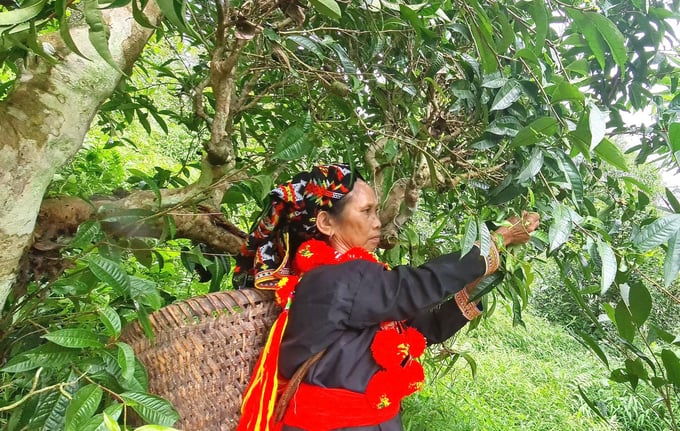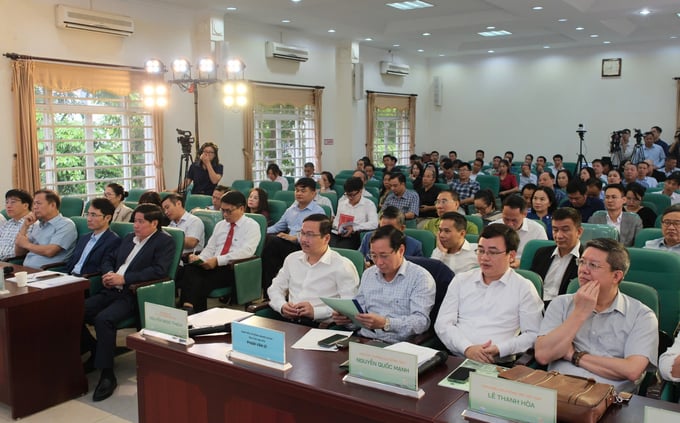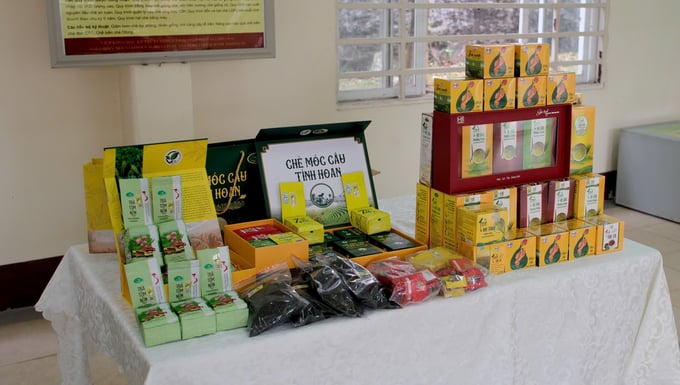May 19, 2025 | 05:57 GMT +7
May 19, 2025 | 05:57 GMT +7
Hotline: 0913.378.918
May 19, 2025 | 05:57 GMT +7
Hotline: 0913.378.918

Former Deputy Minister of Agriculture and Rural Development, Le Quoc Doanh, delivered a speech at the tea development forum. Photo: Quynh Chi.
Mr. Le Quoc Doanh, the former Deputy Minister of Agriculture and Rural Development, highlighted that tea holds a particularly important position in the agricultural crop structure of Vietnam. It is a long-term industrial crop that plays a central role in the country's agricultural development and has a deep historical connection with the Vietnamese people.
"Tea cultivation occupies a substantial area in the midland and mountainous regions of the country. The crop plays a vital role in promoting economic growth, protecting the environment, and enhancing the social well-being of rural communities", Mr. Le Quoc Doanh shared during his remarks.
Reflecting on the remarkable progress of the tea industry over recent years, Mr. Doanh noted the significant growth the sector has achieved, particularly in the last two years. He pointed out that in 2000, the total area dedicated to tea cultivation was just around 70.000ha, but today that figure has expanded to 125.000ha. Moreover, the average yield was 4.9 tons/ha in 2005, whereas now it has more than doubled to 10 tons/ha.
Alongside this progress, the price of tea has shown a clear upward trend, both in the domestic market and in exports. The price has risen from1 USD/kg to around 1.74 to 1.8 USD/kg. According to Mr. Le Quoc Doanh, this positive change is the result of joint efforts from all involved parties. These efforts include the significant contributions of local farmers, management agencies, as well as specialized institutes, backed by strong scientific research and innovation.
For instance, the Institute of Agricultural and Forestry Science and Technology for the Northern and Mountainous Regions alone has more than 20 PhD-level experts focused on tea. These specialists regularly conduct research and provide guidelines on improved cultivation techniques and advanced farming practices.
However, despite the considerable attention the tea industry has received from the Party and the government, it is still confronted with several challenges. One of the key issues identified by Mr. Doanh is the relatively low income that farmers receive from tea cultivation. On average, the price paid for tea buds is only around 0.3 USD/kg, which is far below the prices of other crops such as fruits or coffee, both of which are experiencing increasing market prices. This disparity has placed significant financial pressure on tea producers.
Mr. Doanh also raised an important point about the traditional nature of the tea industry and the fact that it has historically been subsidized by the state, particularly with regard to businesses and market access. "Could this be a reason why we are reluctant to innovate the sector?" he posed. Furthermore, despite having similar tea varieties across regions, there is a significant variation in both productivity and pricing between different tea-growing areas. It is critical for the tea industry and the broader agricultural sector to explore ways of achieving sustainable, long-term growth.

The tea plant has been closely associated with many generations of the Vietnamese people. Photo: Tung Dinh.
As a scientist with many years of experience working in the northern mountainous regions of Vietnam and with key industrial crops such as tea and coffee, former Deputy Minister Le Quoc Doanh emphasized the broad and multifaceted value of the tea plant. He pointed out that tea is a "dual-purpose" crop - it not only provides high and stable income for producers, particularly in remote, rural areas, but also plays a crucial role in preserving soil health.
"I have traveled to survey tea-growing regions across the country, and one thing I’ve consistently observed is that the soil where tea is cultivated remains remarkably healthy. Its fertility shows little decline over time", Mr. Doanh said. He further praised tea as one of the symbolic crops of Vietnam's agriculture, alongside coffee and rice.
Initially, Vietnam started with the basic PH1 tea variety, but over the years, the country has expanded its selection to include a wide range of diverse tea cultivars. Tea, as a perennial industrial crop, not only offers a long-lasting economic lifespan but also provides quick returns and high economic efficiency.
According to the Chairman of the Vietnam Fruit Growers Association, tea is a crop that, once planted, can be harvested for 30 to 40 years, and in some cases, even longer. Today, tea is cultivated in around 40 countries worldwide, with the highest concentration of tea plantations found in Asia, including Vietnam.
The tea cultivation industry in Vietnam has a long history, but large-scale tea farming and exploitation only began over 50 years ago. The production and supply of tea have since been able to meet the growing domestic consumption demand as well as the need for export. For this reason, compared to other crops in Vietnam, tea is one of the most advantageous crops in terms of both climate conditions and labor resources.
"Vietnam can be considered the homeland of tea", said former Deputy Minister of Agriculture and Rural Development. Mr. Doanh also expressed his concerns about the reality that, despite tea's long history and its deep connection with many generations of the Vietnamese people, the number of tea production and processing factories remains quite limited. This is true even in regions that are considered the heart of tea cultivation in the country, such as Thai Nguyen, Tuyen Quang and Phu Tho.
According to Mr. Doanh, one of the encouraging aspects of the tea industry is that there is still significant room for growth. He compared it to the coffee industry, where Vietnam has nearly maximized the yield potential of this crop. Through the VnSAT project, the average yield of Vietnamese coffee has increased by 3 to 3.5 times compared to the global average. However, Mr. Doanh pointed out that, unlike coffee, there is still considerable potential to improve the productivity and quality of tea. Many ecological sub-regions that are well-suited for tea cultivation remain underutilized, offering opportunities for expansion and improvement in the tea sector.

The forum was attended by hundreds of delegates in person. Photo: Quynh Chi.
Having spent decades working closely with the tea industry, former Deputy Minister of Agriculture and Rural Development, Le Quoc Doanh, emphasized that the current stage of Vietnam’s tea sector calls for fresh perspectives and innovative approaches. These should go beyond simply focusing on improving tea varieties and technological advancements. There needs to be a greater focus on branding, promoting the product, and developing standardized raw material zones that are suitable for export.
One of Mr. Doanh's key concerns is the creation of "growth hubs" - regions that can serve as flagship areas to drive the branding and international recognition of Vietnamese tea. He suggested that Thai Nguyen, which is known as one of the country's primary tea-growing regions, could be developed into a recognized specialty zone dedicated to high-quality tea production. This area already has a strong reputation with various traditional tea products, including lotus tea, jasmine tea, and others, all of which have established themselves in the domestic market.
"Thai Nguyen has a wide range of specialty teas, and it has the potential to lead the tea industry forward", Mr. Doanh said. He believes that by leveraging the influence and reputation of Thai Nguyen's tea, the sector could expand into nearby regions such as Phu Tho and Tuyen Quang.
Tea is a versatile crop that can thrive at various altitudes, from below 600 meters, to 600 meters and beyond, which results in a wide range of product quality. Former Deputy Minister Le Quoc Doanh believes that research and innovation by organizations, individuals, and specialized agencies could facilitate the transition from black tea to green tea production.
In addition, he emphasized the importance of diversifying tea products to align with global trends, including the production of specialty products like matcha tea. This aligns with the ongoing direction from the Ministry of Agriculture and Rural Development, which has consistently advocated for "production according to market signals".
For specific regions with unique characteristics, such as Mau Son, there is an opportunity to explore the research and pilot production of specialty tea varieties like oolong tea. This would not only increase the value of local tea products but also serve both domestic consumption and export markets, enhancing the economic potential of these regions.
Professor Dr. Le Quoc Doanh also suggested that the Crop Production Department and local authorities focus on the development of the Shan tea variety. This tea variety holds significant value, not only in terms of its quality but also in its historical and cultural significance. It has gained attention from consumers around the world, especially in China. However, the exploitation of the Shan tea variety still faces many challenges, primarily because it is cultivated in high-altitude areas, where transportation is difficult.
The former Deputy Minister proposed that all stakeholders could develop the Shan tea variety in a "multi-value" direction, in line with the guidance from Minister of Agriculture and Rural Development, Le Minh Hoan. Beyond selling the tea itself, local farmers could "sell more" by promoting the stories, production processes, and cultural heritage associated with this unique variety of tea.

Vietnamese tea products are becoming increasingly attractive and diverse in design. Photo: Quynh Chi.
Thanking the contributions shared at the forum by the Crop Production Department, the Vietnam SPS Office, and local authorities, former Deputy Minister Le Quoc Doanh emphasized the need to pay more attention to food safety and traceability. These are mandatory requirements for export products and, in the future, will also be essential for domestically consumed products.
"The tea produced must be sold", Mr. Doanh stated. Therefore, in addition to traditional markets such as Pakistan, Taiwan, and China, the former agriculture leader suggested dedicating more time to researching emerging markets, such as the United States.
According to Mr. Doanh, Vietnam should deeply leverage its advantages from traditional crops, as well as the value of its homeland's tea heritage. Additionally, he recommended that the Crop Production Department conduct research to develop specific solutions and products for tea cultivation, identifying tea varieties that are not only high-yielding and high-quality but also resilient to climate change in the current context.
Former Deputy Minister Le Quoc Doanh highly appreciated the initiative of the Vietnam Agricultural Newspaper in effectively organizing the tea forum, instead of holding meetings based on a "formulaic" approach. He emphasized that the forum setting is an ideal space to provide valuable information and knowledge related to the production of high-quality, safe tea for a wide audience, including the public and businesses.
Translated by Phuong Linh

(VAN) Minister of Agriculture and Environment Do Duc Duy held a meeting with Soopakij Chearavanont, Chairman of C.P. Group, on May 15.
/2025/05/16/3800-0-nongnghiep-143756.jpg)
(VAN) Suntory PepsiCo Vietnam coordinated with the Ministry of Education and Training to implement an education program on water conservation, reaching nearly 1 million primary school students nationwide.

(VAN) Vietnam’s TH Group officially put its high-tech fresh milk processing plant into operation in the Russian Federation, marking a historic moment as the first TH true MILK cartons were produced in Russia.

(VAN) Use of high-quality broodstock and biotechnology is regarded as the most effective approach to ensuring sustainable and economically viable shrimp aquaculture ahead of climate change and the emergence of increasingly intricate disease patterns.

(VAN) Carbon farming is a form of agricultural practices that helps absorb more greenhouse gases than it emits, through smart management of soil, crops, and livestock.

(VAN) This is a key content of the Memorandum of Understanding recently signed between the Vietnam Fisheries Society and Kunihiro Inc of Japan.

(VAN) To achieve the goal, local authorities and businesses in Kon Tum province have fully prepared the necessary conditions for the new Ngoc Linh ginseng planting season.